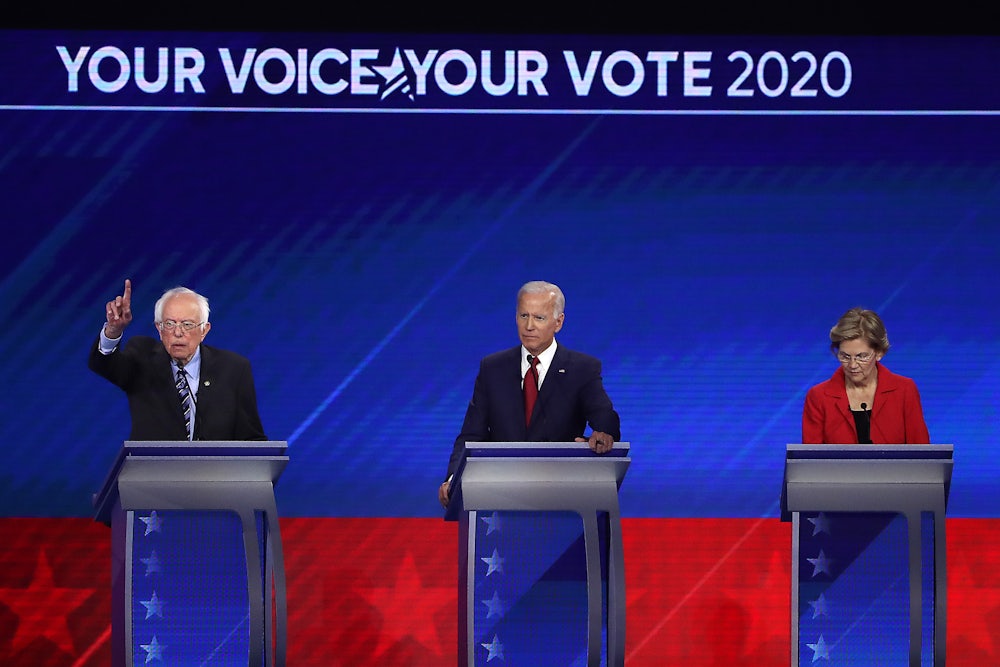The third Democratic primary debate, at least for the first 90 minutes, wasn’t half-bad. The candidates were asked surprisingly tough questions by the ABC debate moderators, challenged to defend the blemishes on their records. They even turned the spotlight on one another to spur some entertaining, and useful, exchanges. Then debate moderator and Univision anchor Jorge Ramos tapped his cue cards and read the following bizarre question to Senator Cory Booker to kick off what would be the debate’s sole climate change portion:
“Let me ask you about the recent fires in Brazil. After the recent fires in the Amazon, some experts have suggested that eating less meat is one way to help the environment,” Ramos said. “You are a vegan since 2014—that’s obviously a personal choice—but President Trump and Brazil’s President [Jair] Bolsonaro are concerned that climate change regulations could affect economic growth. So should more Americans follow your diet?”
The question, once it had stopped swerving and dipping and landed on its final destination of framing the encroaching crisis around the question of bacon or no bacon, drew a round of laughter from both the crowd and from Booker. With the inquiry, ABC made clear just how serious the network was about investing time in the most pressing issue facing the nation and the globe: not at all. After months featuring dissatisfaction with the scant climate coverage in prior debates, criticism of the Democratic National Committee’s refusal to hold a dedicated climate debate, and exhaustion at CNN’s seven-hour town hall attempting to fill the gap, the third Democratic primary debate spent a grand total of seven minutes on the issue Democratic voters consistently rate as one of their top concerns in the 2020 elections.
To his credit, Booker, responding to the veganism query, answered the question that Ramos should have asked, calling out the consolidation of the agriculture industry and the subsequent contributions of factory farms to overall worldwide carbon emissions. But like the debate’s planners, Booker opted not to use his full time on climate change, shortening his response to go back to a previous question about foreign policy.
The remaining six minutes the debate devoted to climate change featured a handful of shining moments, but on the whole was another painful reminder of how sorely this election needs a serious presidential debate on this issue. Of the ten candidates, only six were prompted to speak on climate change, and that excluded two of the top three politicians, going by polling: Senator Bernie Sanders and former Vice President Joe Biden. Among those who were allowed to speak, former Congressman Beto O’Rourke and Senator Elizabeth Warren were the only two to offer specific goals for when they plan to have America at a net-zero carbon emissions. O’Rourke said halfway by 2030 and at net-zero by 2050, while Warren responded that she would aim to reach a carbon neutral status in all new buildings by 2028, in cars by 2030, and in electricity manufacturers by 2035.
Warren also unsurprisingly offered one of the best points of the brief segment, pointing to the rampant corruption that defines the deep-rooted relationship Congress and American politics have with the fossil fuel industry.
“Why doesn’t it happen?” Warren asked, referring to action on global warming. “As long as Washington is paying more attention to money than it is to our future, we can’t make the changes we need to make. We have to tackle the corruption head on so we can save our planet.”
Senator Kamala Harris criticized GOP lawmakers for having a “lack of courage,” then recycled a line from her time at the CNN climate forum about solutions to Los Angeles air pollution. Andrew Yang nearly seemed like he was going to be able to add something substantive to Warren’s point, but instead used the opportunity to plug his Democracy Dollars plan. After Yang finished, moderator Linsey Davis chimed in, pivoting the debate to education. That was it for climate conversation.
The cold hard truth is that most people don’t visit all ten candidate websites before the debates or even the primaries. Most folks don’t have time to root through even five or six detailed proposals. Yet they still need a candidate who will offer real solutions to rising sea levels and more frequent and violent storms and all the ills that are on our doorstep. This is why the debate medium exists: to give voters a chance to hear and see the candidates speaking directly to them—and to each other—about the most important issues facing the country.
We ought to be past the point of asking open-ended, overly general questions like “What are you going to do about climate change?” or “What’s going to happen to my cheeseburgers” to a candidate who has little shot of claiming the nomination. Americans should be hearing precisely how the chosen candidate will take on GOP obstructionism in the Senate to get wide-reaching climate legislation passed. They should be watching the top four candidates stand on a stage next to one another, engaging with one another, explaining how their plans to fight global warming differ—just as the debates regularly prompt candidates to do on health-care policy or Afghanistan withdrawal timelines. Inexplicably, climate change, despite its demonstrable importance to Democratic voters, isn’t getting the same treatment—even CNN’s marathon town hall couldn’t feature the candidates side by side, due to DNC restrictions.
Instead, viewers are being forced either to drag through seven-hour forums, or tune into debates to listen to Senator Amy Klobuchar land non-catchy punchlines like, “You know that movie The Day After Tomorrow? It’s today.” After three debates featuring such shallow climate segments, it’s clear the discussion the candidates need to have among themselves will be put off until the victor is staring across the stage at President Donald Trump. And by then, any hope for the conversation we need most will be long gone.
